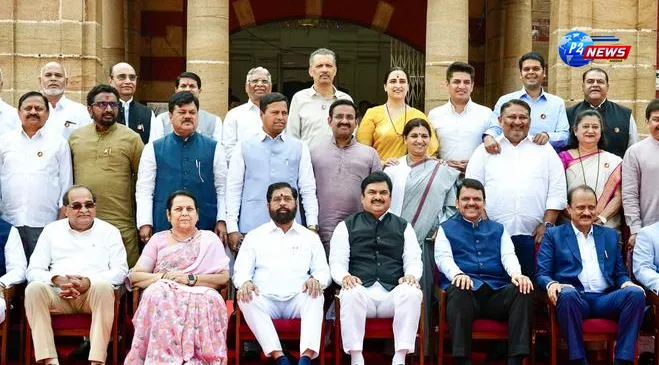On December 15, 39 ministers took their oaths, marking the beginning of the session. This follows Mr. Fadnavis and his two deputies, who were sworn in earlier on December 5, setting the stage for the new administration's activities.
On December 15, 39 ministers took their oaths, marking the beginning of the session. This follows Mr. Fadnavis and his two deputies, who were sworn in earlier on December 5, setting the stage for the new administration's activities.
The recent cabinet portfolio allocation in Maharashtra has solidified the positions of key political leaders while introducing a fresh wave of young talent into the state government. On December 21, 2024, Chief Minister Devendra Fadnavis announced the distribution of portfolios among the ministers, retaining significant departments for himself, including Home, Law and Judiciary, and Energy. Deputy Chief Ministers Eknath Shinde and Ajit Pawar received the Urban Development and Finance departments, respectively, outlining a strategic approach in the governing coalition.
Despite facing internal disagreements, the Mahayuti partners successfully detailed the appointments on the concluding day of the winter session of the Maharashtra legislative assembly. With a total of 33 cabinet ministers and six ministers of state receiving their designated roles, this allocation reshaped several portfolios from the previous government while ensuring that the leaders maintained control over their preferred areas of governance.
The Bharatiya Janata Party (BJP) has retained the revenue portfolio, which is seen as a significant political win, while the Nationalist Congress Party's (NCP) Aditi Tatkare will continue to oversee the Women and Child Development department amidst prior discussions regarding its potential transfer to a senior BJP female minister. The current cabinet also highlights the inclusion of emerging leaders from the BJP, with Nitesh Rane and Jaykumar Gore taking charge of Fisheries and Rural Development, respectively.
Chief Minister Fadnavis will oversee five ministries, incorporating important sectors such as Home and Energy, along with General Administration and Information and Publicity. DCM Eknath Shinde will hold the Urban Development portfolio, paired with Housing and Public Works, while DCM Ajit Pawar maintains authority over Finance and Planning, additionally acquiring the State Excise department, which was previously associated with the Shinde faction.
Notably, the Home portfolio is not under Shinde's direct management; however, Yogesh Kadam has been assigned as the Minister of State for Home (Rural). Certain ministers have had to adapt to new roles, with senior BJP figure Radhakrishna Vikhe Patil transitioning from Revenue to Water Resources. Amidst ongoing protests in Beed and controversies regarding NCP leader Dhananjay Mundhe, he steps into the position of Food and Civil Supplies Minister after having previously served as Agriculture Minister.
The cabinet allocation, which followed a week after the cabinet expansion and nearly a month post the State Assembly elections, was framed without any external interference, as asserted by Chandrashekhar Bawankule. In a landscape where political dynamics are fluid, the careful selection of ministers reflects a conscious effort to maintain regional balance, especially with the impending BMC elections. With two ministers from Mumbai included in the cabinet, the BJP is strategically positioned as Ashish Shelar manages Information Technology and Cultural Affairs, while Mangalprabhat Lodha oversees Skill Development, Employment, Entrepreneurship, and Innovation.
As the cabinet structure formalizes, the complete list of portfolio assignments provides clarity on responsibilities: Chandrashekhar Bawankule heads the Revenue Ministry, while Radhakrishna Patil oversees Water Resources. Other notable appointments include Hasan Mushrif as Minister of Medical Education and Ganesh Naik in charge of the Forests Department. The distribution also includes Gulabrao Patil managing Water Supply and Sanitation, with Dadaji Bhuse responsible for School Education.
Further responsibilities are delegated with Uday Samant remaining as Minister for Industries while the portfolios of Skill Development, Employment, and Entrepreneurship will be held by Mangalprabhat Lodha. The distribution of roles places emphasis on a balanced representation, incorporating several sectors ranging from Tourism and Mining to Social Justice. A comprehensive approach seems to outline the governance strategy in Maharashtra moving forward, reflecting both continuity and adaptation to the evolving political landscape.
In addition to the cabinet appointments, six Ministers of State have also been appointed. Among them, Ashish Jaiswal takes charge of multiple departments, while Madhuri Misal and Pankaj Bhoyar receive varied portfolios, indicating a thorough organizational effort. This allocation appears to encapsulate the government’s vision moving ahead, underscoring the commitment to governance while addressing the needs of their constituencies.
As Maharashtra embarks on this new chapter under the revamped cabinet, the political landscape is set for potential transformations, driven by the interplay of established leaders and the infusion of new talent that aims to address the diverse needs of the state. With a comprehensive portfolio assignment, the government is poised to tackle the challenges ahead, fostering a sense of stability amid the shifting political currents.
Like
Dislike
Love
Angry
Sad
Funny
Pray
'Trump Tracker: Tulsi Gabbard's Surprising Appointment as US Intelligence Chief
November 14, 20249th Ayurveda Day in Melbourne: A Celebration of Ayurvedic Innovations and Global Health Impact
November 10, 2024🍪 We Value Your Privacy and Experience Hi there! We use cookies to enhance your browsing experience, provide personalized content, and analyze site traffic. By continuing to use our site, you consent to our use of cookies.







Comments 0